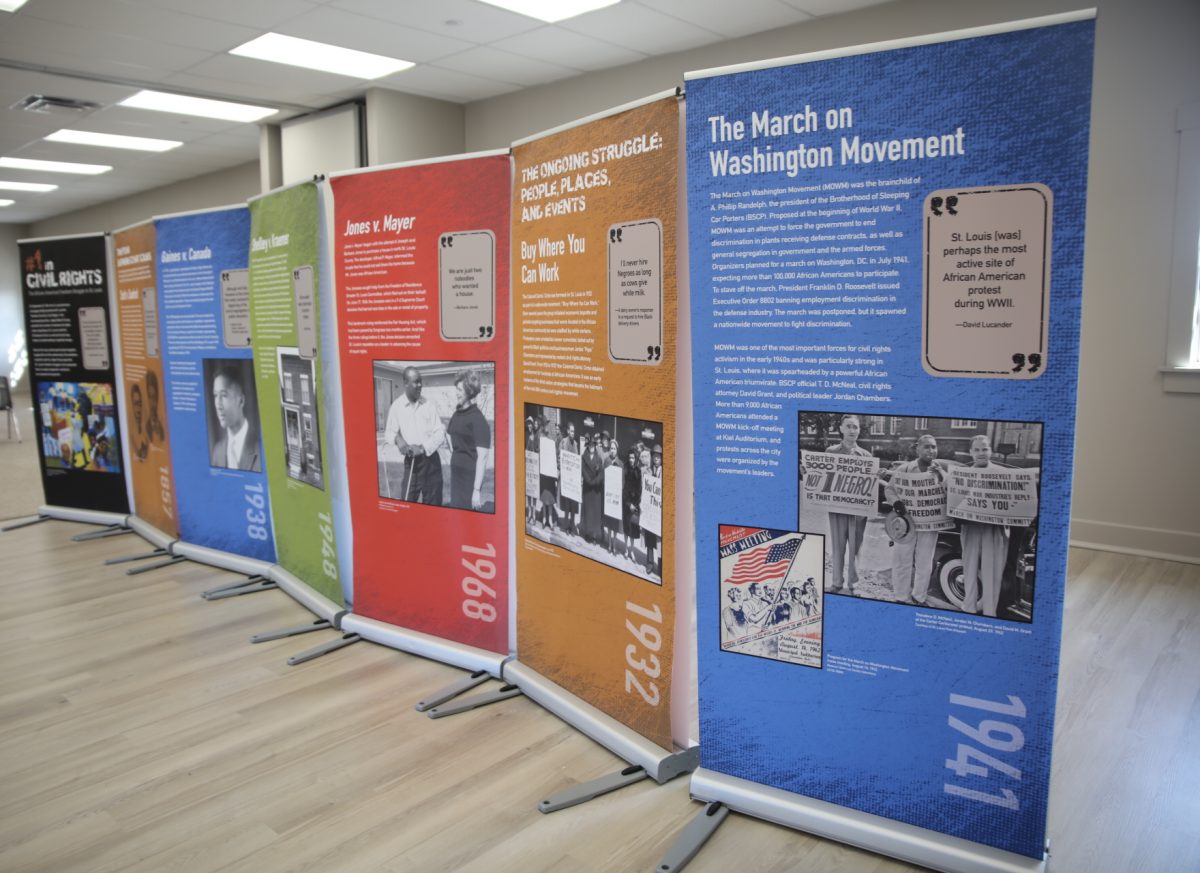As his town-hall meeting came to a close last week at the Cliff Cave Branch County Library, state Sen. Jim Lembke, R-Lemay, recommended a couple of books to the roughly 20 constituents present.
One of the titles was “The Law” by 19th century French economist Frederic Bastiat, which cautions against government becoming too involved with the economy at the expense of life and liberty. It was Lembke’s text of choice as he joined three fellow Republican senators last month in an all-night filibuster to block a bill appropriating millions in federal stimulus dollars.
The move highlighted the intraparty struggles Lembke said Republicans experienced during the first session of the 96th General Assembly, despite having majorities in both the House and Senate.
“Some people think that’s a bad thing,” Lembke said. “I happen to think, the slower government moves, the better, because every time we pass a bill you lose a little bit of your liberty.”
The General Assembly, which adjourned its session May 13, sent 149 bills to Gov. Jay Nixon’s desk out of nearly 1,500 that were filed. As he has for the nearly 10 years he’s been in Jefferson City, Lembke used last week’s town-hall meeting to review the previous session’s successes and setbacks, discuss future legislation and take questions from the public.
The senator put considerable emphasis on the unsuccessful so-called “China hub” legislation, which would have awarded up to $360 million in various business tax breaks for development of an air cargo transportation hub at Lambert-St. Louis International Airport for shipping products to and from China.
The Senate tied the measure to a package of cuts to other tax credits that would total roughly $1.5 billion over 15 years. The plan would’ve required legislative reauthorization and caps of various tax credit programs, including the largest — used by developers for historic building preservation. But the House refused to accept the tax-credit provisions, and the bill stalled despite negotiations leading up to the session’s adjournment.
Lembke said Missouri’s 61 tax credits are “very convoluted and messy,” noting that they cost the state roughly $500 million a year in revenue.
“What we were trying to get was reform to those …,” Lembke said, referring to the Senate’s proposal. “Well, the advocates for these tax credits didn’t like it … because they don’t have to justify themselves up against any other appropriation that we make. And they were afraid that if we were going to appropriate that dollar that we were going to give them and we had to set that up against education, for instance, and the funding of education, where would the Legislature go? Would they fund that dollar to tax credits or would they fund it to education?
“… So that bill didn’t pass, even though I believe it was a very important bill, and it’s the bill that the governor’s been talking about calling us back in special session on that might coincide with our veto session in September when we’re down there anyway. They’re trying to get a deal together to go back and work on that issue.”
It’s important because Missouri — facing an 8.9-percent unemployment rate — is, like other states, trying to find ways to be more competitive in terms of attracting and retaining businesses and creating jobs, he said.
The sticking point, he said, is the government’s role in that endeavor.
“Does government have a role?” he said. “My position is that the best thing government can do is get out of the way and let capitalism work and let business create jobs.”
Lembke touched on some of his own measures that failed to gain traction last session, such as a bill to reduce the number of representatives to 103 from 163 after the next census and a resolution rejecting judicial pay increases. The former issue never made it to the House, and the latter was voted down in a committee.
Among the bills that made it through the General Assembly was a measure placing on the November 2012 ballot a constitutional amendment requiring government-issued photo identification to vote.
Lembke touted the measure, which also provides for a nine-day early voting period, as a compromise between Republicans and Democrats. But Nixon on Friday vetoed the bill, contending the photo-identification mandate “would disproportionally impact senior citizens and persons with disabilities, among others, who are qualified to vote and have been lawfully voting since becoming eligible to do so, but are less likely” to have the required identification.
“Disenfranchising certain classes of persons is not acceptable,” Nixon, a Democrat, wrote in a veto letter.
Lembke also pointed to the considerable amount of time legislators spent redrawing Missouri’s congressional districts, a process required after every census that culminated in the elimination of the district currently held by U.S. Rep. Russ Carnahan, D-St. Louis.
Also successful, Lembke noted, were bills requiring drug tests of welfare recipients who are suspected of using controlled substances, expanding the Quality Jobs Program to offer tax breaks to qualified small businesses that create jobs and imposing restrictions on late-term abortions.
The senator also touched on successful but “very contentious” legislation changing restrictions on dog breeders that voters approved as Proposition B in November. He said he opposed tweaking the law only a couple of months after voters approved it.
Lembke also rejected all but two of the 13 bills approving the state’s fiscal 2012 budget.
“I did that because although we said we passed a balanced budget this year, I would argue that we did not,” Lembke said, citing millions in one-time federal stimulus moneys, withholdings and unrealized savings. “… We have a structural hole in our budget of $600 million. That’s a real problem.”
Lembke and fellow senators filibustered bills appropriating stimulus funds to extend benefits to unemployed Missourians and for other purposes.
“All we’re doing is kicking the can down the road …,” Lembke said. “What I wanted to do was make some very difficult cuts to the budget for this fiscal year coming up and then not have it be so painful in the next fiscal year. I … was one of only a handful of senators that actually voted against this budget, against the bills, in the Republican majority because I think we have to send a message not only to the taxpayers in the state but to the federal government that we’re going to live within our means; we expect you to live within your means.”
Missouri Digital News contributed information to this story.








